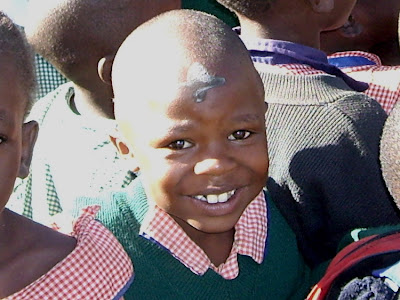In Kenya there are two official languages, English and Swahili. When I first arrived in Nairobi I was surprised to see that the English language is very common here. Nearly everybody in Nairobi speaks English. Many of the signs and billboards are printed in English too. But I also realized that if I really want to live among the people here in Kenya and gain their respect, I will have to learn some Swahili.
While in Nairobi my fellow volunteers and I spent many hours with a native Kenyan by the name of Joram. Joram was our Swahili teacher. He would come knocking at our door each morning to give us an intense two hours or more of Swahili. Swahili, I heard, is supposed to be an "easy language." I can't say that I find it easy, but I have picked up some basics. Two interesting facts about Swahili are that, unlike English, every letter in every word is always pronounced and never made silent and also there are no words to denote "he" or "she." When a Kenyan tries to apply these same rules to English, Americans can get a little confused. Many Kenyas will pronounce every letter in "Wednesday," literally saying, "WED-NES-DAY." Sometimes a Kenyan will also refer to a man as "she" or a woman as "he." But I suppose they should be allow to make a couple mistakes considering that most Kenyans speak better English that American's speak Swahili. There are also words spoken in "sheng" or "slang" which is a combination of both Swahili and English.
Here are some Swahili basics.
Msamiati (MM-SAAM-EE-AH-TEE) - "Vocabulary"
Kiswahili (KEE-SWA-HEE-LEE) - the Swahili language
Habari (HA-BAR-EE) - greeting "How are you?"
Mzuri (MM-ZUREE) - response "Good"
Hodi (HO-DEE) - greeting "May I come in?"
Karibu (CAR-E-BOO) response - "Welcome"
Tafadhali - (TA-FAD-HAAL-EE) - "Please"
Asante (A-SAAN-TAY) - "Thank you"
Jambo (JAAM-BO) - "Hello"
Salama (SA-LAAM-A) - "Peace"
Kwahari (KWAA-HARE-EE) - "Goodbye"
Asubuhi (AS-OO-BOO-HE) - "Morning"
Mchana (MM-CHAAN-AA) - "Afternoon"
Jioni (JEE-O-NAY) - "Evening"
Usiku (OO-SEE-KOO) - "Night"
Leo (LAY-O) - "Today"
Ndiyo (NN-DEE-O) - "Yes"
Hapana (HAA-PAAN-A) - "No"
Bwana (BWAAN-A) - "Man"
Bibi (BEE-BEE) - "Woman"
Matoto (MAA-TO-TO) - "Child"
Baba (BA-BA) - "Father"
Mama (MA-MA) - "Mother"
Dada (DA-DA) - "Sister"
Kaka (KA-KA) - "Brother"
Mzungu (MM-ZOON-GOO) - "white person"
Nyumbani (NEE-OOM-BAAN-EE) - "Home"
Jina (JEE-NA) - "name"
Nchi (NN-CH-EE) - "Country"
Mji (MM-JEE) - "City or Town"
Samba (SH-AAM-BA) - "Farm"
Rafiki (RA-FEE-KEE) - "Friend"
Simba (SIM-BA) - "Lion"
Kitabu (KEE-TA-BOO) - "Book"
Shule (SHOO-LAY) - "School"
Matatu (MA-TAA-TOO) - "Minibus"
Baiskeli (BI-SKELL-EE) - "Bicycle"
Gari (GAR-EE) - "Car"
Gari la Moshi (GAR-EE-LA-MO-SHEE) - "Train"
Chukula (CHAW-KOOL-A) - "Food"
Kinywaji (KEE-NEE-WA-JEE) - "Drink"
Choo (CHOO) - "Toilet"
Pesa (PAY-SAA) - "Money"
Kanisa (KHAN-EE-SA) - "Church"
Mungu (MUN-GOO) - "God"
Sheng (SHANG) - "Slang"
Sasa? (SA-SA) - greeting "Now?"
Fit (FIT) - response "Well"
Mambo? (MAAM-BO) - greeting "Things?"
Poa (PO-A) - response "Cool"







 Mandazi (Kenyan donuts)
Mandazi (Kenyan donuts)











 I have since had rat poison put into my ceiling and I have seen my first victim. The poison I am using is called Storm and it's pretty brilliant. When ingested the rats become very thristy and come out of the roof to find water. Shortly after they find themselves "belly-up" outside, and not in my ceiling. Poor buggers!!!
I have since had rat poison put into my ceiling and I have seen my first victim. The poison I am using is called Storm and it's pretty brilliant. When ingested the rats become very thristy and come out of the roof to find water. Shortly after they find themselves "belly-up" outside, and not in my ceiling. Poor buggers!!!

 The streets of the Mukuru slum.
The streets of the Mukuru slum. 

 Mukuru Primary School Classroom.
Mukuru Primary School Classroom. Children and I at Mukuru Primary School.
Children and I at Mukuru Primary School.














.jpg)
